A nanny is a professional caregiver who provides personalized care for children in their homes.
Nannies are highly trained and experienced in child development, and they work closely with families to create a safe and nurturing environment for children to grow and learn. They are also responsible for planning and executing age-appropriate activities, handling discipline issues, and maintaining a clean and orderly home. In short, nannies are dedicated professionals who provide comprehensive care for children.
Nannies can work in different arrangements depending on the family’s needs. Some of them may live with the family they work for, while others may work a set schedule during the day and go home in the evenings. Some of them work part-time or temporarily. It ultimately depends on the family’s requirements and the nanny’s availability and preferences.
A nanny typically works long hours, often ten or more per day, and may also work on weekends. In addition to providing general care and supervision, nannies may also be responsible for homework help, transportation, light housekeeping, and meal preparation.
Families hire a nanny for many reasons, but the most common is that they want their children to have individualized attention and care while allowing parents or guardians to focus on other responsibilities.
Nanny Contract Templates
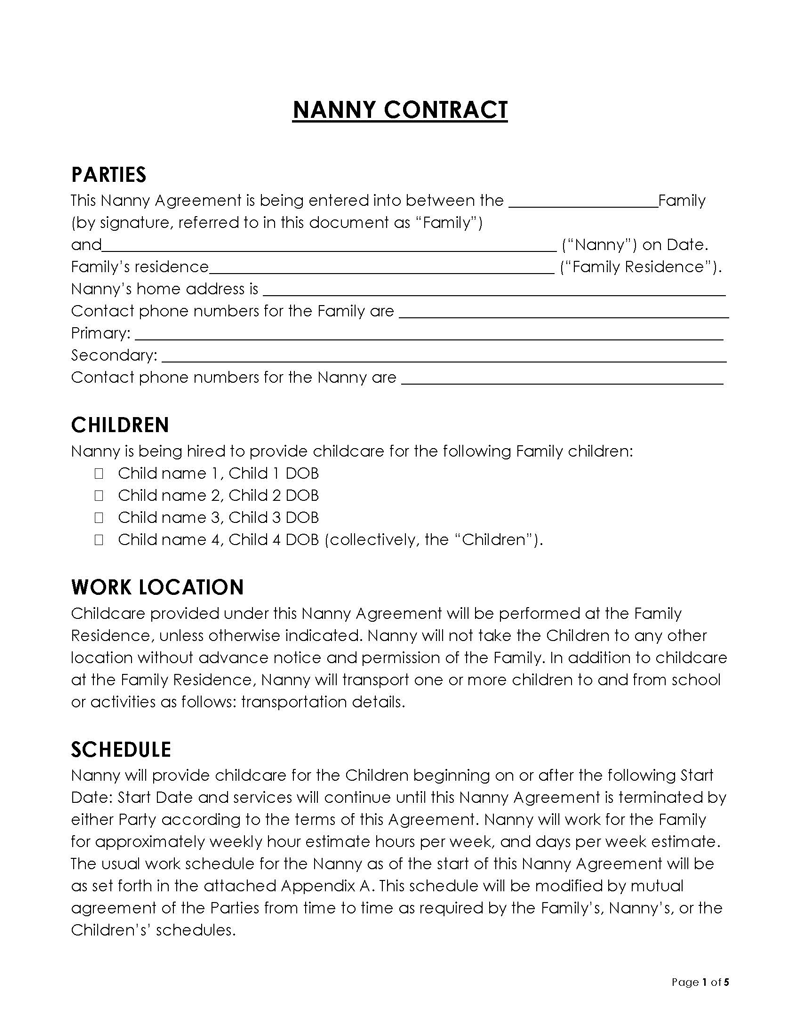
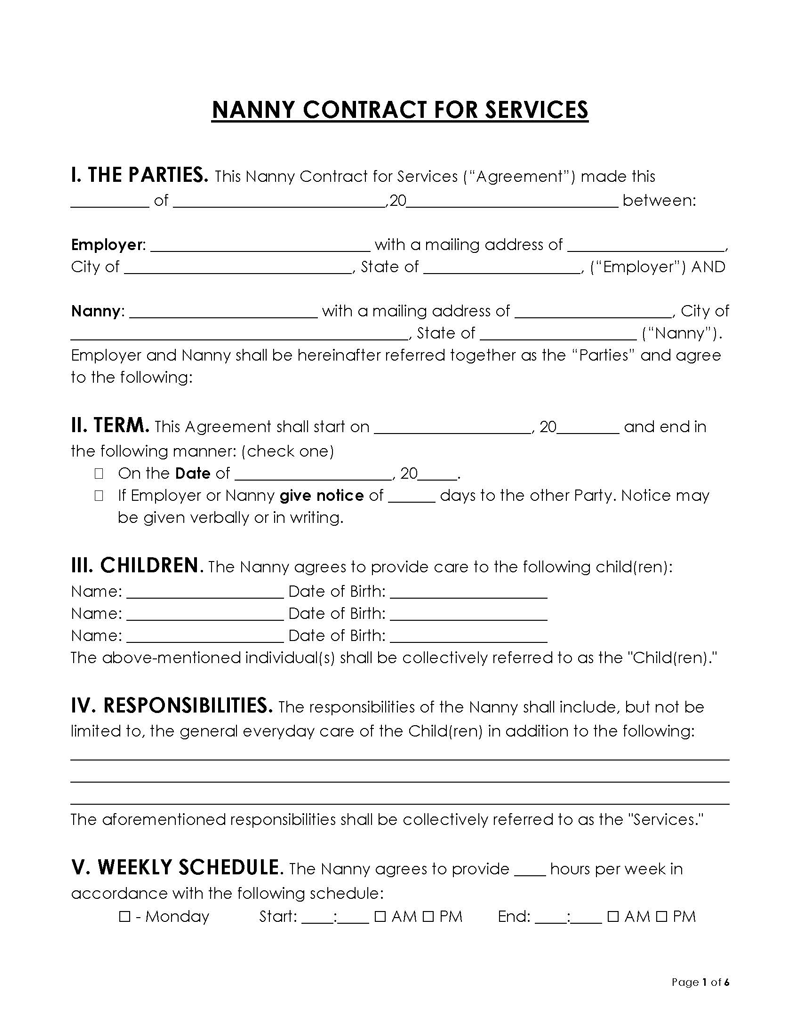
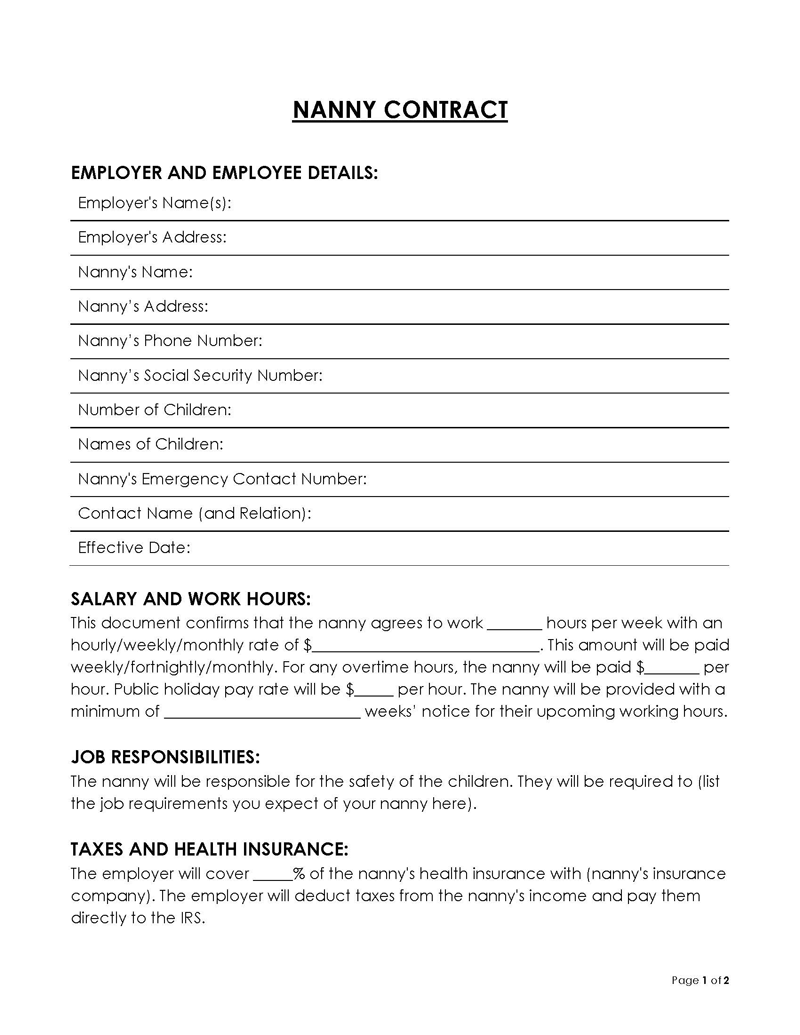
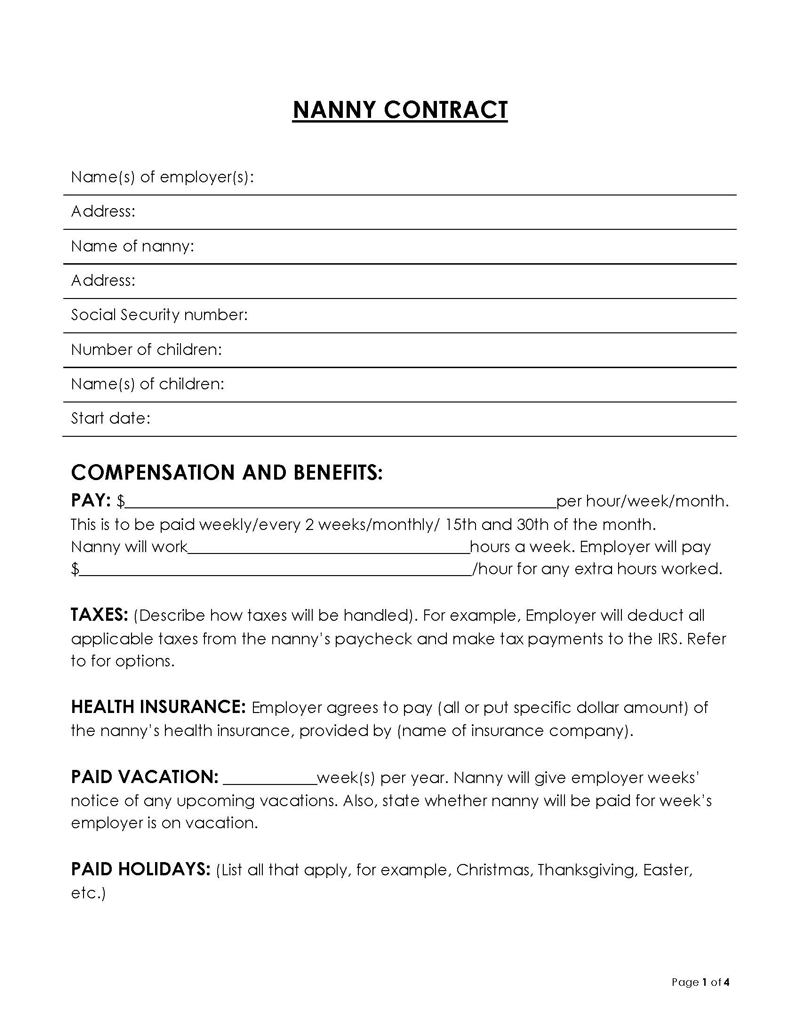
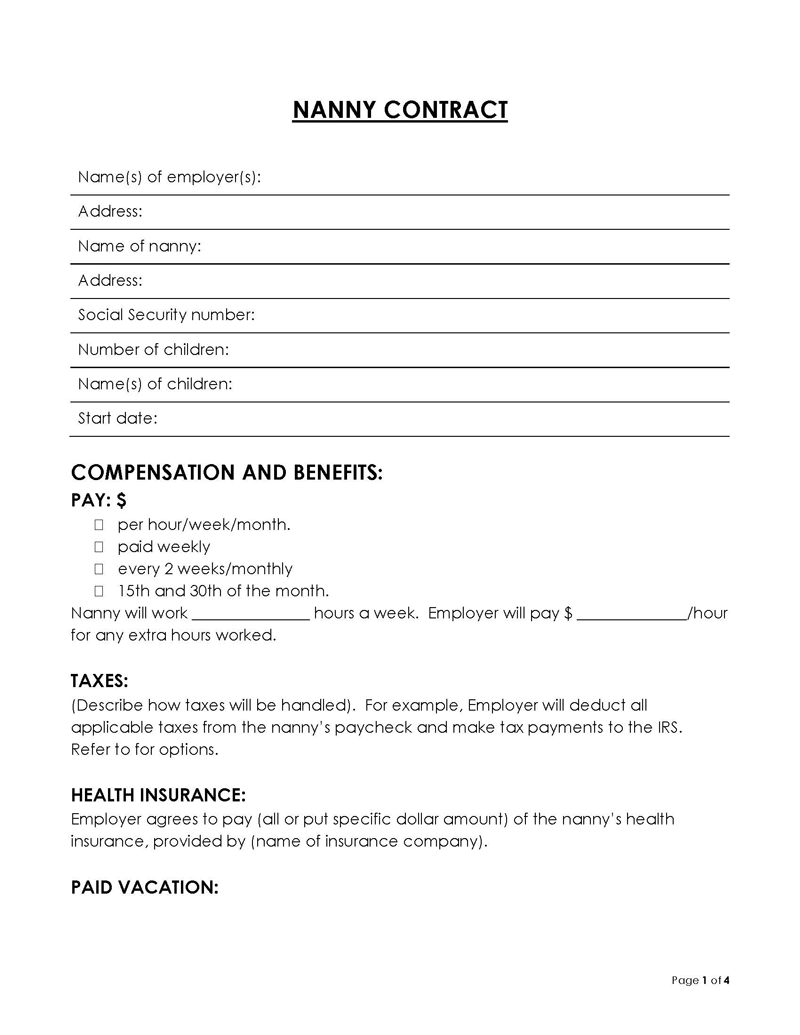
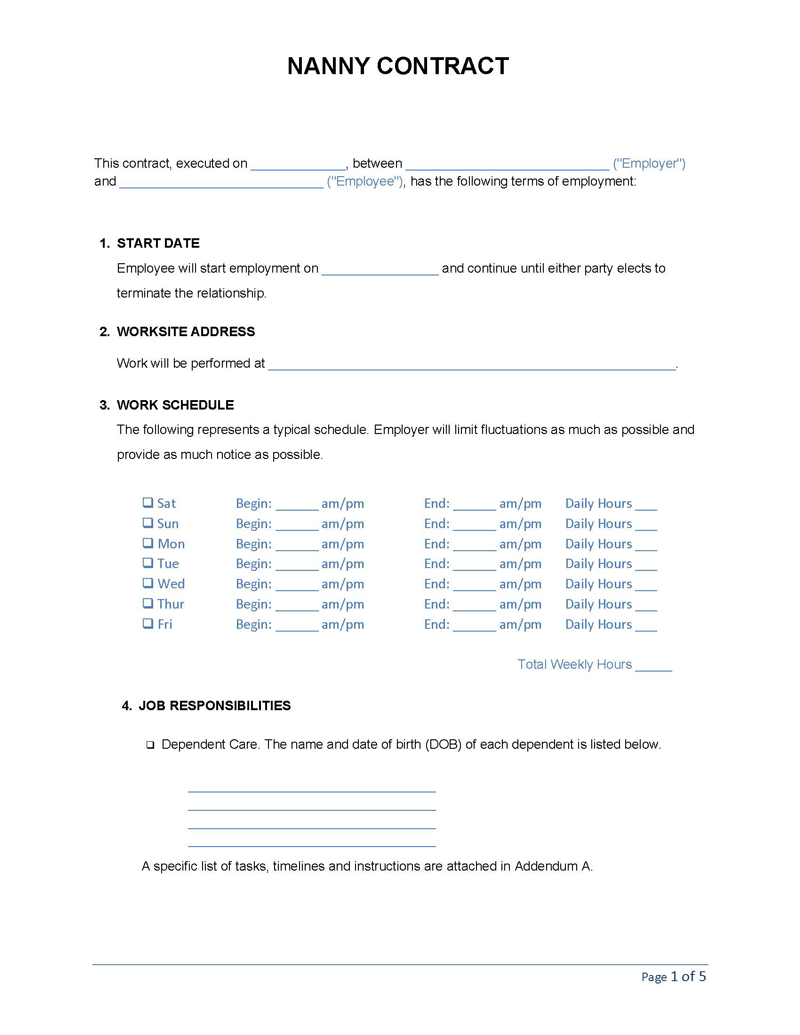
What is a Nanny Contract?
A nanny contract is a legal agreement between a nanny and the nanny’s employer that outlines the duties, salary, and other terms of employment.
The contract can be used to protect both the nanny and the family she works for by specifying expectations and preventing misunderstandings. A nanny contract template can be found online or through an attorney. The contract should be customized according to the specific needs of the family and nanny, and both parties should sign it before work begins.
Purpose of the contract
Creating a contract when hiring a nanny’s services is important for both the family and the nanny. The purpose of the contract is to establish clear expectations and responsibilities for both parties and to ensure that everyone is on the same page regarding important details such as compensation, work hours, and job duties.
For the family, the contract provides a written agreement that outlines the terms of the employment arrangement and helps to protect their interests. It can also provide peace of mind, knowing that both parties are in agreement on important issues and that the nanny is committed to fulfilling her duties.
For the nanny, the contract provides a clear understanding of their job duties and responsibilities, compensation, and benefits. It can also serve as a legal document that protects their rights and ensures that they are treated fairly and according to the terms of the agreement.
Overall, creating a contract is an important step in the hiring process when it comes to nanny services, as it helps to establish a clear and mutually beneficial employment arrangement.
Who Creates Nanny Contract?
Typically, the family who is hiring the nanny creates the contract. However, it is recommended to consult with a lawyer or legal professional to ensure that the contract complies with the relevant laws and regulations and adequately covers all necessary terms and conditions. The nanny may also have the opportunity to review and suggest revisions to the contract before signing.
Nanny v/s Babysitter
The terms “nanny” and “babysitter” are often used interchangeably, but there are some significant differences between the two. A nanny is typically a caregiver with experience in childcare and is responsible for all aspects of care for the children in their charge. They may have formal training in early childhood education.
On the other hand, a babysitter is usually hired when someone is needed to watch the children for a few hours. While a babysitter may provide primary childcare, they are not typically responsible for tasks such as feeding, bathing, or putting the children to bed. As a result, nannies tend to be paid more than babysitters. Whether to hire a nanny or a babysitter will ultimately depend on the family’s specific needs.
What to Include in Nanny’s Contract
Contracts must adhere to all applicable employment laws. In the event of litigation, you will want the contract prepared adequately.
Here are some things to consider when creating your contract for a nanny:
Nanny’s details
First, you want to ensure you have the nanny’s legal name and identification. This can be in the form of a passport or driver’s license. By having a copy of this documentation, you can be sure that you have the correct information.
In addition, get the nanny’s contact information, including their phone number, address, and social security number. It is also essential to have the contact information of someone serving as an emergency contact for the nanny.
Employer details
Be sure to include information about yourself and your family. Include your contact information, like your full name, address, phone number, and email address. Also, make sure the contract has the contact information of your partner or spouse in case you are not reachable. It should also include information about the children, like their names and ages and any allergies or medical conditions they may have.
Lastly, detail your work schedule—your work hours, days off, and vacation days—and be clear about your expectations for the nanny’s job duties, including house rules, bedtimes, homework help, meal preparation, etc.
Work schedule and hours
A work schedule is one of the most important aspects of any contract. Outlining the nanny’s regular hours, start and end times, days off, and vacation time will help prevent misunderstandings and scheduling conflicts.
EXAMPLE
If the nanny is expected to work on weekends or holidays, this should be stated explicitly. It is also essential to be clear about any additional hours that may be required, such as evenings or weekends.
Employment terms, duties, and responsibilities
The contract should outline the employment terms, duties, and responsibilities of the nanny. These may include preparing meals, feeding and bathing the children, doing laundry, providing transportation, and helping with homework. These duties must be clearly defined so there is no confusion about what is expected of the nanny. The contract should also specify any rules or guidelines she is expected to follow.
EXAMPLE
The family may request that the nanny not smoke or use foul language in front of the children. There should be a clear description of any areas of the home that the nanny and kids are not permitted to access.
Use of household equipment
When it comes to the use of household equipment, there are a few things that should be included in the contract. First, it should be stipulated which items the nanny is allowed to use and which are not permitted.
EXAMPLE
Can she use the family car for errands, or is she expected to walk or take public transportation? Specifying how long the nanny can use household items is also essential.
Finally, the contract should specify what happens if she damages an item. Will she be responsible for repair or replacement costs?
Salary
An employment contract should always include salary information. This will help avoid any misunderstandings later. You will want to be sure to agree on a fair salary that compensates the nanny for their time and experience.
Be sure to include the hourly rate and any overtime or holiday pay that may be applicable. Specifying how often the nanny will be paid, whether weekly, bi-weekly, or monthly, is also essential.
Benefits
The benefits they will receive are an essential component of a contract. This can help attract qualified candidates and show that you are committed to taking care of your employee.
Some benefits you may want to consider offering are health insurance, paid vacation, and a 401(k) plan.
- Health insurance is essential for peace of mind and should be considered if your budget allows it. If you cannot offer health insurance, consider offering a stipend to help offset the cost of buying their policy.
- Vacation days are essential and show that you value the fact that she takes adequate breaks from work. A general rule is to offer two weeks of paid vacation per year.
- A 401k plan can be a great way to help your nanny save for retirement. Many employers match a certain percentage of employee contributions, so this is something to consider if it is feasible for your family.
Including these benefits in an employment contract can help attract and retain the best candidates.
Termination policy and clause
The termination policy should be clearly described if either party needs to terminate the agreement. The policy should specify the notice period required for either party to terminate the agreement and any severance pay that may be due. It is also essential to include a clause that outlines what will happen in the event of a breach of contract by the nanny.
EXAMPLE
If the nanny is caught smoking cigarettes on the job, this should be grounds for immediate termination.
Confidentiality
It is essential to include a clause in the contract regarding confidentiality. This ensures that your nanny understands the importance of keeping family matters private. This is particularly important as nannies tend to access confidential family information like health, finances, and other personal details.
In addition, nannies should be aware that they may be privy to confidential conversations between family members. As such, it is vital to have a contract stipulating that she will not share confidential information with anyone outside the immediate family.
Setup Payments and Taxes
Before hiring a nanny, you must understand all the payment and tax regulations. The nanny will need to complete one IRS form called Form W-4 if they are an employee or Form W-9 if they are an independent contractor. As the employer, you should keep a copy of the completed form for your records.
A preferred payment method should also be agreed upon. If the nanny prefers ACH, they must complete the Direct Deposit Authorization Form. Once all of these matters are arranged, the hiring is complete.
Frequently Asked Questions
The duties of a nanny vary depending on the family’s needs, but some everyday tasks are typically included. These include feeding and changing diapers for infants, preparing meals, doing laundry, doing light housekeeping, and helping with homework. In addition, a nanny may oversee bath and bedtime routines, transport the children to specific places for their activities, and provide general child care.
You can terminate a nanny’s employment by providing her with written notice of termination. The notice should state the effective date of the termination and the reasons for the termination. If you terminate a nanny’s employment because she is no longer needed, you should give her at least two weeks’ notice.
However, note that you cannot terminate an employee based on race, gender, national origin, age, handicap, sexual orientation, or marital status. If you do so, you may have to face a discrimination lawsuit.
Many factors determine whether or not to give a salary raise to a nanny. Some common considerations include the nanny’s workload, length of employment, recent cost-of-living increases, and the employer’s overall financial health. Other important factors, such as the family’s relationship with their nanny, may also affect this decision. When deciding to give a raise, it is essential to consider all of these factors carefully.
While there are numerous advantages to using a nanny camera, such as peace of mind and the ability to monitor your children while you are away, there are also some legal implications to consider. In most states, it is legal to use a nanny camera in your home without the consent of your babysitter or nanny. However, a few states require you to disclose the camera’s presence to the person being recorded. If you are unsure about the laws in your state, it is best to consult with an attorney before using a nanny cam.










